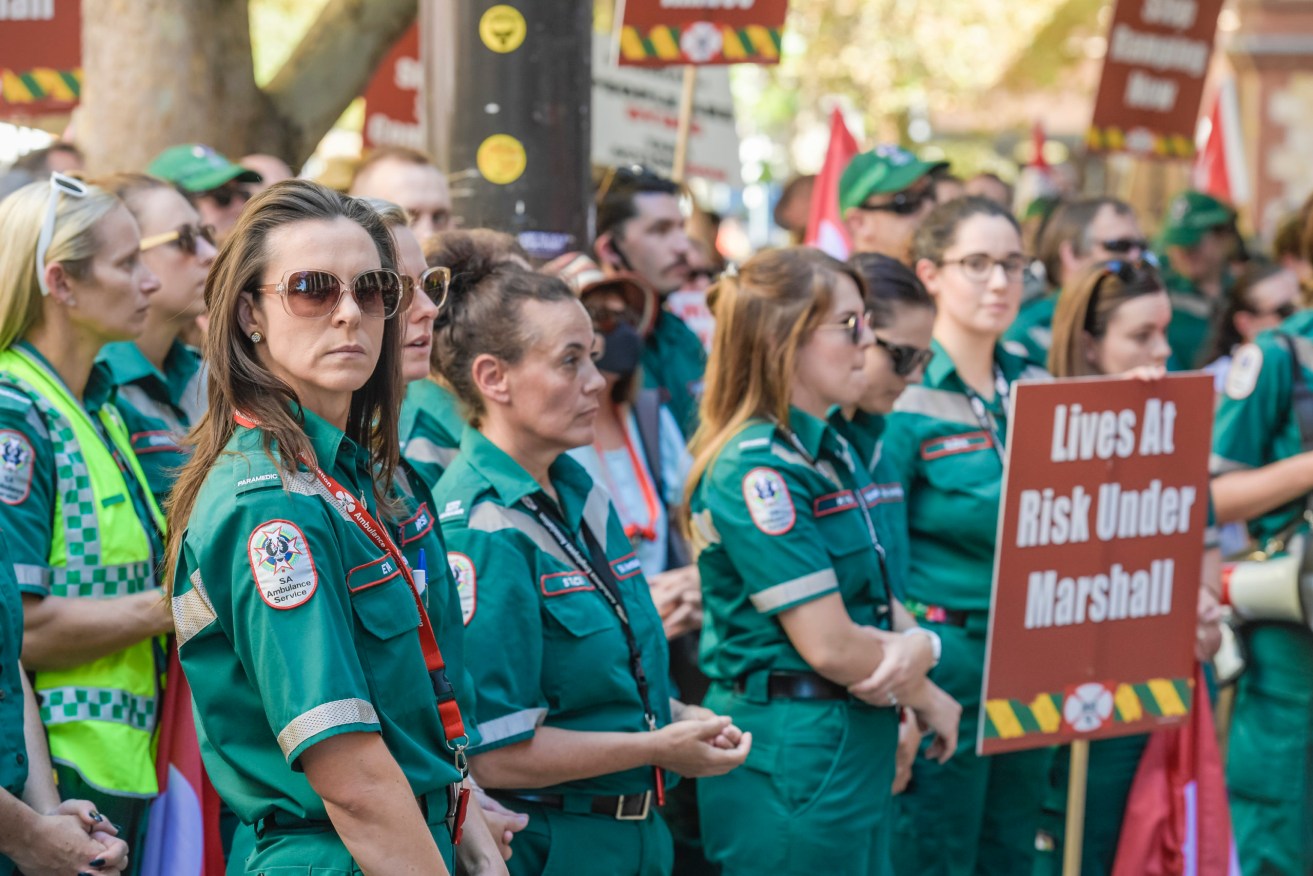Ambulance union defends post-election silence
The Ambulance Employees Association has defended its decision to wind down a high-profile, $400,000 campaign targeting ramping and ambulance resourcing following Labor’s state election victory, despite continued pressure on the hospital system.


An Ambulance Employees Association-led protest against the Marshall Government in 2021. Photo: Roy Vandervegt/AAP
The union ran a sustained media campaign against the former Marshall Government, with its updates on ramping and patient deaths marring the final days of the Liberal Party’s campaign and backing Labor’s strong election focus on the health system.
In the two weeks prior to the March 19 state election, the AEA highlighted the cases of four patients it said had died waiting for an ambulance which did not arrive on time. The union also regularly made significant ambulance ramping incidents public throughout the Marshall Government’s term.
Since Labor’s election victory, the union has only publicised one significant ramping incident – the case of a man in his 60s who passed away after entering cardiac arrest and spending five hours on the ramp at the Flinders Medical Centre.
AEA SA general secretary Leah Watkins said she understood why people questioned the union’s change in approach.
“I can understand people’s cynicism in that they saw a certain level of media push and attention from us prior to the election and there has been a stark change – despite the [ramping] situation not having that stark change as well,” Watkins told InDaily.
“We know that ramping is not significantly better overnight, albeit our response is significantly different.
“But the situation was so important back then that the public were aware of how bad things were, and also holding the [Marshall] Government to account … to make them publicly answer for these types of cases that they were minimising [and] deflecting,”
The AEA, which spent $400,000 on its state election campaign, has also significantly curtailed its social media campaigning.
In the 52 days since the election, the union’s Twitter account – a key source of information about ramping incidents and pressure on the ambulance service – has tweeted only 22 times.
That’s well below the 100 times the union tweeted in the 52 days up to and including the March 19 election.
The AEA also did not tweet anything from April 27 to May 8, despite the ambulance service declaring Opstat White events on May 7 and May 8. Opstat White status is declared when the ambulance service’s capacity is “insufficient to maintain effective service delivery for high acuity cases”.
Opposition Health spokesperson Ashton Hurn said it was “certainly surprising to see the union go so quiet on ramping”.
“They were out on the issue almost daily during the election campaign and now it’s radio silence,” she said in a statement.
“It’s astonishing that despite disturbing reports of patients literally being left out in the cold waiting for emergency care at the Lyell McEwin, they’ve been silent.”
But Watkins said the union only has three office workers and the pre-election campaign it ran was not sustainable.
“We are now refocusing our efforts on working with the health department, the government and the ambulance service on implementing everything as quickly as can be,” she said.
“That’s why there has been a change in the way we work. I had said straight after the election that we can’t keep this up.”
She also said the union is no longer being “flooded” with information from members about patient deaths and ramping incidents.
“That has dropped off a lot because members now see a light on the tunnel, they can see that work is being done and they know that that will take some time,” she said.
“The difference is now we have a government that is acknowledging how bad things are, making significant commitments and taking significant action now to fix it.
“That’s why we’ve taken the step not to publish the cases with the frequency in what we were prior to the election.”
Asked whether this meant the public was not being informed about significant incidents in the health system, Watkins said: “I would imagine that if there had been a patient death due to a delayed response, the members would have notified us.”
“Sometimes it’s not always appropriate for us to publicise a case, and we had applied the same sort of sensitivity prior to the election.”
She later conceded the union “don’t have the individual stories to tell as much as we did prior to the election” and “we’re not informed about them as much as what we were by members prior”.
She also said the union has called on the Malinauskas Government to make more data publicly available, such as up to date ambulance response time averages and Opstat declarations.
“We have put to the Labor Government that it is incumbent upon them to release information about the responsiveness or the performance of the health system,” she said.
“They should be releasing that, it shouldn’t be on us having to use confidential, sort of backdoor means of getting information from certain anonymous people and then publishing it.”




